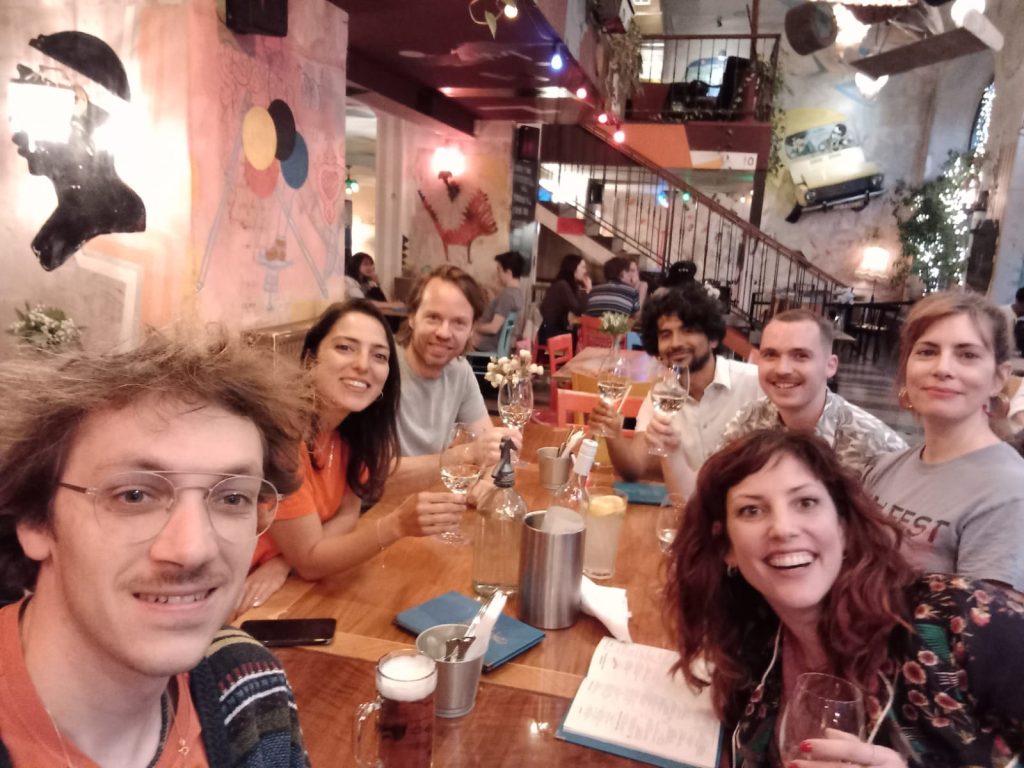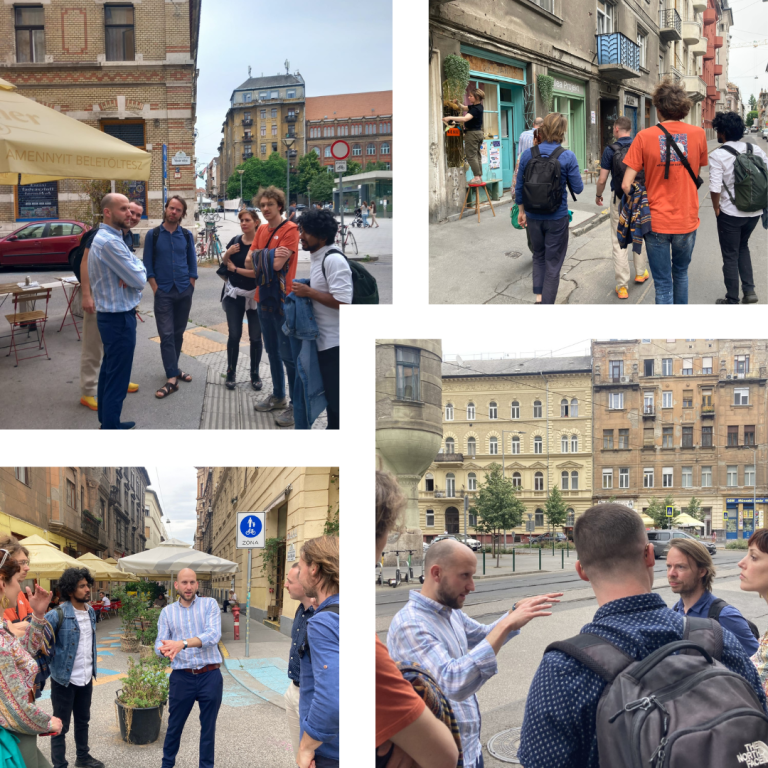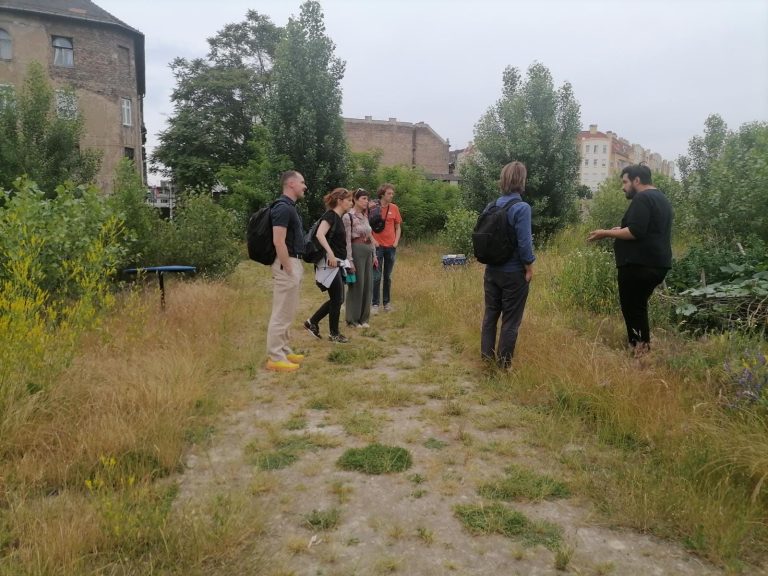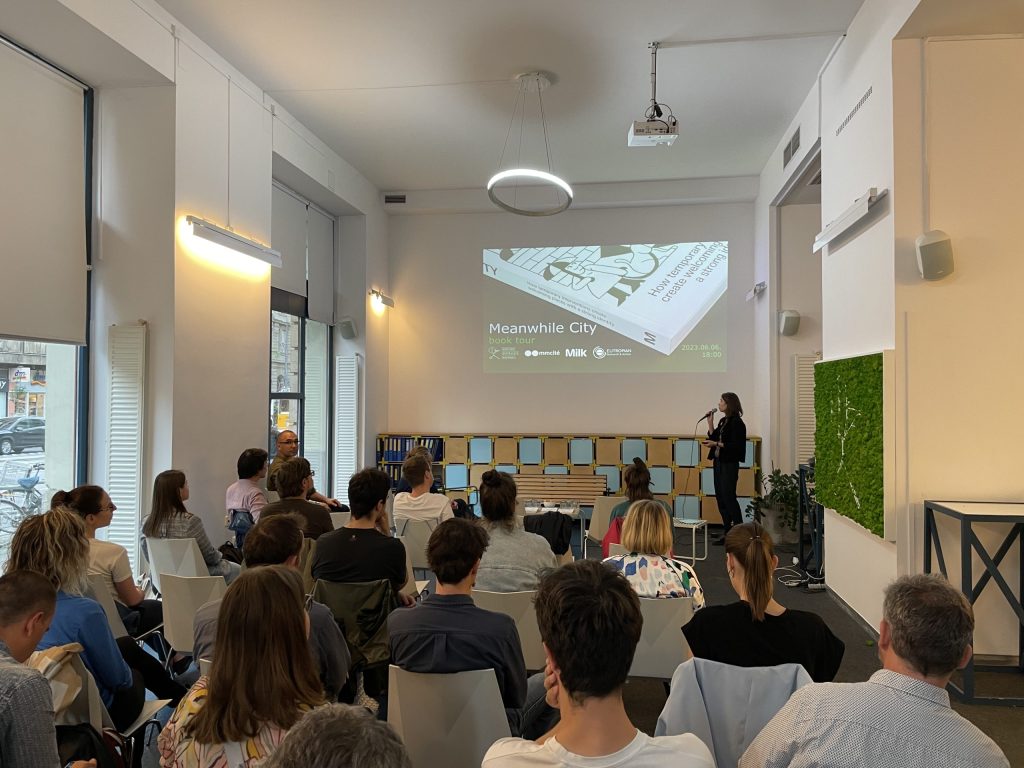Subscribe to our joint NEWSLETTER for
EUTROPIAN &
COOPERATIVE CITY MAGAZINE


While many of you know Budapest for its beauty, architecture and nightlife, there is another side to the city. Budapest is also buzzing with activists and independent civic players who are making the city edgy, diverse and collaborative, despite working under a government that at best does not encourage civic ecosystems, at worst, is blocking their operations. Eutropian has played an active role in local civic ecosystems in Rome, Vienna and Budapest, engaging with initiatives of social inclusion, sustainability and participation. Therefore, members of the Budapest office were keen to introduce their fellow Eutropian colleagues to some of our project partners, and show a vibrant city full of energy, and dynamic and trailblazing initiatives and spaces. Our packed itinerary inspired all of us during our workshops and resulted in lots of new ideas.
Did you know that even though Budapest has the river Danube running through it, the riverbanks are pretty much inaccessible to pedestrians? Valyo, our friends and co-workers at Valyo Bázis community and co-working space, aim to open up the riverbank for community use and integrate the river into the lives of locals. They have managed to successfully work together with the municipality and the Pest side central riverbanks will be car-free on weekends throughout the summer. The timing of our workshop coincided with one of the first weekends of a pedestrianised Danube bank, so we could stroll along the river and take in all the magnificent views.
Apart from Valyo, we also share our office space with Cargonomia, offering eco-friendly urban cargo transport and distribution of local and regional organic food. It also provides space for community events and workshops around the themes of sustainability and non-growth. One of their distribution points is our office at Valyo Bazis where locals receive weekly organic foodboxes from Zsámboki Biokert, a biodynamic farm near Budapest, one of Cargonomia’s partners. We had the opportunity to visit the farm and learn about its values and activities from the owners.This experience feeds into our work as Eutropian has been exploring food systems in Europe and participates in the design and implementation of food policies in Rome, Milan and Budapest.

We were thrilled to get a personalised guided tour by Daniel Radai, vice mayor of Józsefváros (District 8) in Budapest about the neighbourhood’s latest projects and developments.
This once stigmatised inner city neighbourhood has been going through a massive transformation in recent years: it is not only Budapest’s most diverse district, it is a vibrant and exciting neighbourhood with a multitude of artistic, civic and social initiatives, and myriads of community and cultural events and street carnivals.
Led by a mayor with a grassroots civic background, a lot of the transformation is due to the efforts of the Józsefváros municipality working tirelessly to improve social dialogue with the locals, creating participatory processes informing and complementing local governance and decision-making.
Eutropian has been supporting Józsefváros’s Office of Community Participation in the Horizon 2020 project EUARENAS in the development of residential assembly models in social housing units.
Eutropian has been supporting Józsefváros’s Office of Community Participation in the Horizon 2020 project EUARENAS in the development of residential assembly models in social housing units.
Despite the Hungarian government’s anti-LMBTIQA+ politics, community garden Szeszgyar in the 8th district is alive and fighting its ground. Szeszgyar upholds eco-feminist, queer, rewilding and vegan values and holds group events and gatherings on a massive, 7700 square metre land in Józsefváros. Many are surprised that such a huge green, wild space is hidden from sight, amongst residential buildings in the centre of Budapest. After decades of standing vacant on the grounds of a former distillery factory, the space was opened up a few years ago by a group of volunteers who are using the space for free until the plot gets a buyer.
Just a few hundred metres away is Gólya cultural and community hub that functions as a bar, and concert and events venue. We had drinks on the terrace of Gólya with Csaba Jelinek, co-founder of Periféria Policy and Research Center, and learnt about Kazan Community House, which houses the Gólya Cooperative and many other social businesses and organisations. Kazán is a true community property for its users and the neighbourhood residents, and one of the only collectively-owned community spaces in the country.

nspired by all the activities, ideas and meetings so far, the Eutropian team got down to some serious work over two days. Of course, serious work still needs some fun and games so a few of our topics were explored and developed through our own Eutropian-developed board game! Our focus this time was creating modules for capacity-building trainings for municipalities and NGOs to gain knowledge and skills to develop collaborative processes, widening our work with deliberative democracy processes and tools to strengthen society through stronger participation, fundamental in these times of threatened democracy in Europe and beyond, and creating events around our projects on food systems and food market activation, energy communities, social entrepreneurship, and inclusive placemaking in the framework of urban environmental sustainability.

On our final day we strolled around Bartok Boulevard near our office, popped into new community and exhibitions spaces, and even attended the booklaunch of Meanwhile city – A guide to temporary interventions, a joint event between Eutropian and KÉK (Hungarian Contemporary Architecture Centre), moderated by Eutropian’s Levente Polyak.
Bartók Boulevard, near our offices, was envisioned as a creative and cultural urban quarter by Újbuda Municipality in the mid 2000s. The programme included the renovation of public spaces along the boulevard and a strategy to prioritise and subsidise the use of ground-floor commercial spaces by cultural and creative organisations.
The transformation process is widely seen as successful, and the area has not only become one of the most popular areas in Budapest, but caught international attention as well. In 2019 and 2021, Újbuda was ranked by the readers and experts of Time Out magazine among the best neighbourhoods in the world.
| Cookie | Duration | Description |
|---|---|---|
| cookielawinfo-checkbox-analytics | 11 months | This cookie is set by GDPR Cookie Consent plugin. The cookie is used to store the user consent for the cookies in the category "Analytics". |
| cookielawinfo-checkbox-functional | 11 months | The cookie is set by GDPR cookie consent to record the user consent for the cookies in the category "Functional". |
| cookielawinfo-checkbox-necessary | 11 months | This cookie is set by GDPR Cookie Consent plugin. The cookies is used to store the user consent for the cookies in the category "Necessary". |
| cookielawinfo-checkbox-others | 11 months | This cookie is set by GDPR Cookie Consent plugin. The cookie is used to store the user consent for the cookies in the category "Other. |
| cookielawinfo-checkbox-performance | 11 months | This cookie is set by GDPR Cookie Consent plugin. The cookie is used to store the user consent for the cookies in the category "Performance". |
| viewed_cookie_policy | 11 months | The cookie is set by the GDPR Cookie Consent plugin and is used to store whether or not user has consented to the use of cookies. It does not store any personal data. |
